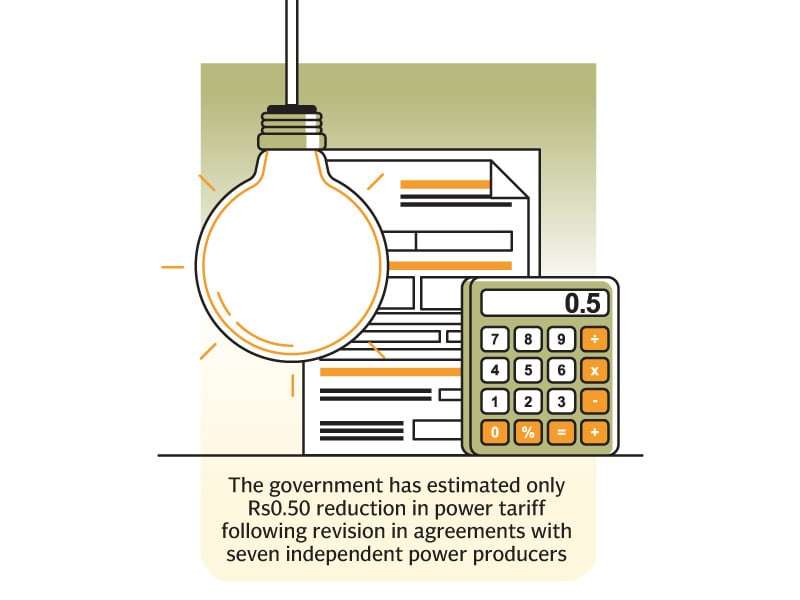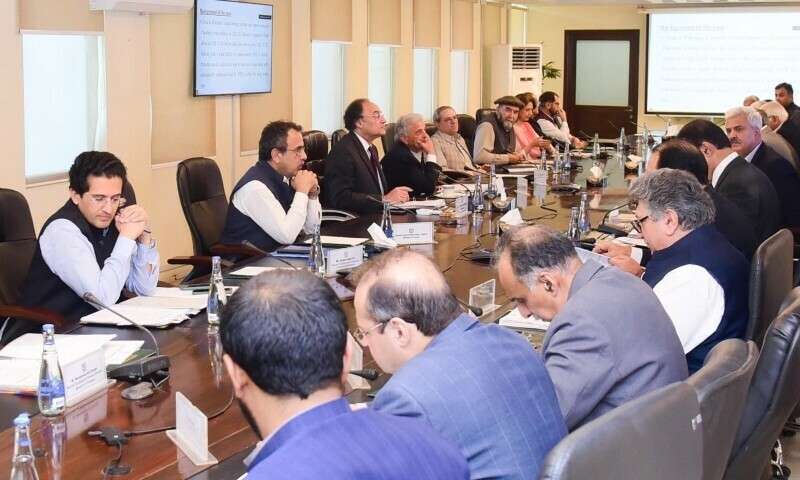ISLAMABAD: The government anticipates a minor decrease in electricity tariffs—around Rs0.50 per unit—following renegotiated contracts with seven independent power producers (IPPs).
Despite this modest tariff cut, Power Division officials assert that the revised agreements will generate overall savings of Rs920 billion over the lifespan of these IPPs. However, when compared to the annual capacity payments ranging between Rs2.5 trillion and Rs2.8 trillion, the savings appear relatively small.
During a public hearing on Monday, the National Electric Power Regulatory Authority (Nepra) was informed that, after renegotiating agreements with seven power producers, consumers would see a minor reduction in electricity costs.
The revised agreements were finalized with the following power companies: Nishat Power, Nishat Chunian Power, Saif Power, Sapphire Electric, Engro Power, Narowal Energy, and Liberty Power Tech.
No Coercion in Agreement Revisions
At the hearing, questions arose regarding whether IPPs were compelled to modify their agreements. Power Division officials firmly rejected these claims, emphasizing that the seven companies voluntarily accepted the revisions.
However, certain IPPs, such as Orient Power, declined to renegotiate, which is why they were not included in the tariff revision petition. Officials assured that discussions with the remaining IPPs are ongoing to reach a mutually beneficial resolution. To date, agreements have been restructured with 29 IPPs willing to adjust their tariffs.
Tariff Reduction Dependent on Electricity Sales
Government representatives explained that the Rs0.50 per unit reduction would depend on electricity sales volume. Lower electricity sales could potentially negate this reduction, while increased consumption could result in a more significant price cut.
Concerns Over Furnace Oil Pricing
During the hearing, interveners questioned the fixed price of furnace oil at Rs165,000 per ton, arguing that since Pakistan currently has minimal furnace oil consumption, refineries have resorted to exporting one million tons of oil.
Government officials clarified that any future reduction in furnace oil prices would be passed on to consumers. Additionally, pricing mechanisms have been linked to the Karachi Inter-bank Offered Rate (Kibor), which was previously set at 4.5% but has now been revised to Kibor plus 1%.
IMF’s Role in Passing Tariff Relief to Consumers
Concerns were also raised about whether the International Monetary Fund (IMF) had intervened to prevent the government from transferring tariff relief to consumers. However, no official confirmation was provided regarding IMF’s stance on this matter.
Waiving of Late Payment Surcharges
Seven power producers have agreed to forgo late payment surcharges totaling Rs11.19 billion:
- Nishat Power: Rs1.77 billion
- Nishat Chunian Power: Rs1.84 billion
- Saif Power: Rs1.6 billion
- Sapphire Electric: Rs1.39 billion
- Engro Power: Rs1.7 billion
- Narowal Energy: Rs1.5 billion
- Liberty Power Tech: Rs1.35 billion
Previously, Nepra had issued notices to these IPPs due to excessive profit margins, leading to legal challenges. Now, under a settlement, Nepra will withdraw its notices, and the government will recover excess profits earned until 2023.
Revised Financial Mechanisms
According to the new application submitted to Nepra, operational and maintenance costs for Nishat Chunian Power and Liberty Power Tech will be adjusted per the revised agreements. For other IPPs, the previously approved costs for the quarter ending September 30, 2024, will remain unchanged.
Additionally, indexation will be capped at either 5% per annum or the average National Consumer Price Index (NCPI) over the last 12 months, ensuring more stable pricing mechanisms. Any depreciation of the PKR/USD exchange rate will only be accounted for up to 70% annually, whereas any appreciation will be fully reflected in consumer rates.
For foreign capital operating and maintenance expenses, inventory costs will be calculated based on a seven-day supply at 100% load factor for Residual Fuel Oil (RFO) and a 15-day receivable period at 15% load factor for gas-based power plants.
RFO pricing has been fixed at Rs165,000 per ton, excluding sales tax, which has been removed from the working capital calculation. The spread over Kibor for working capital has been reduced from 2% to 1%, with future indexing set at Kibor plus 1%.
Lastly, the maximum insurance cost component is now capped at 0.9% of the approved Engineering, Procurement, and Construction (EPC) costs.
FAQs
1. What is the expected reduction in electricity tariffs following the revised IPP agreements?
The government estimates a decrease of Rs0.50 per unit, depending on electricity sales volume.
2. How much will the government save from these renegotiated IPP agreements?
The total estimated savings are Rs920 billion over the operational lifespan of these seven IPPs.
3. Were IPPs forced to revise their agreements?
No, Power Division officials stated that the revisions were made voluntarily by the seven participating companies.
4. Why did some IPPs refuse to renegotiate their agreements?
Certain IPPs, such as Orient Power, opted out of the revised agreements and are not included in the revised tariff structure.
5. Will these tariff reductions directly benefit consumers?
While there is an anticipated reduction, factors like electricity sales volume and IMF policies may influence whether consumers receive the full benefit.



